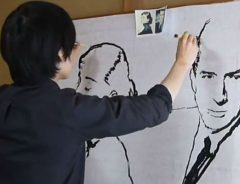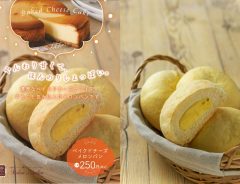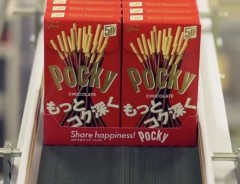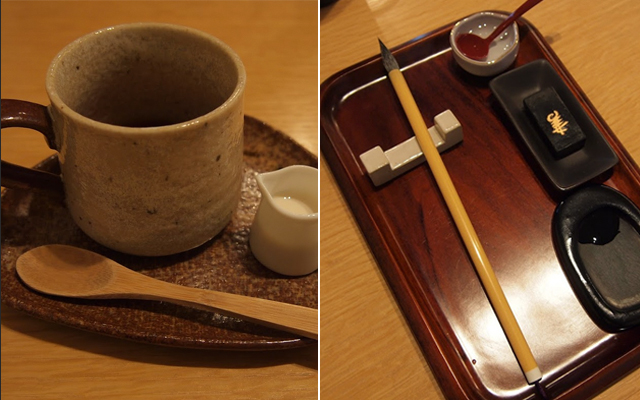Related Article
-

Cooking artist bakes up amazing Magikarp pie and other Pokémon, Animal Crossing delights
-

Japanese Artist Masterfully Paints Two Portraits Simultaneously, And Demonstrates Traditional Style Of Sumi-E
-

Japanese bakery fuses two favorites with their new “Baked cheese cake Melon-pan” winter release
-

Very Thin Sliced Pufferfish Sashimi Is A Once In A Life Time Luxury
-

Artist’s snow dogs look just as cute as the real deal
-

Virtual Pocky Factory Tour Will Make You Want A Box Of Pocky Right Now



Kamakura is home to over 110 temples, but you don’t necessarily have to go to one to pay respects to the Buddhist religion.
During a visit to Kamakura, my sister and I stumbled across a rather curious sign. It showed an image of a Buddha statue and read: お寺カフェ (Otera Cafe). Since otera is the Japanese word for “temple,” we could only speculate that it was a temple-themed cafe of some sort — something we had never seen before, not even in Japan.
The sign also said, “Produced by Jyoenji,” which was presumably was one of the many temples in Kamakura. A cafe produced by a temple? We found the whole concept to be funny (albeit a bit strange), especially when we saw that there was a Mini Sutra Set on the menu. Guessing from the picture, it consisted of a small calligraphy set and a cup of coffee.
It’s not every day you see a temple-themed cafe. Out of pure inquisitiveness we climbed the stairs that led to the cafe, saw that there were, in fact, several people sitting with a calligraphy set in front of them, and decided to go in.
The cafe wasn’t huge, but the room was brightly lit and cozy. The cafe owners — a monk, and his wife — shuffled in and out from behind the counter, waiting on customers as though they were waiting on members of their family. We took off our coats and sunk into the cushy seats, finally getting a respite after a long day of sightseeing.
I decided to test out my calligraphy skills by ordering the Mini Sutra Set, while my sister ordered tea and some Japanese sweets. Not that I had high hopes for myself — I hadn’t touched a calligraphy brush in ten years, and my handwriting is far from neat.
The monk soon shuffled by with two pieces of paper. One had the sutra I was to copy, and the other showed instructions on how to prepare the calligraphy set. Embarrassingly, I had no clue what the sutra said.
“Try to focus on writing and nothing else. Ideally you’ll block out all the noise around you. It won’t be easy, but try your best to concentrate,” the monk said before he left me with brush, ink, and paper.
Instead of copying the sutra freehandedly, I chose to trace it. I’d assumed it would be easier, but after the first few strokes, I realized I had been very, very, wrong.
This is exhausting. The music’s making me lose focus. Now the monk's talking to that couple over there... would be nice if he spoke a little more quietly.
My “meditative” sutra-tracing continued as I slogged on, my energy being depleted by the stroke.
“Can I do the last line?” my sister, eating away, asked.
I slid the calligraphy set to her, discreetly so the monk wouldn’t notice. I didn’t want him to think I wasn’t taking this seriously.
A few minutes later we were finished, our imbalanced collaboration staring back at us under the soft light of the afternoon sun.
“So... how do you feel?” my sister asked.
I told her I was tired, that I hadn’t been able to concentrate with all the noise, and that the monk — who had been the one that had told me to concentrate — had actually been the most distracting. So much for meditation, right?
But he soon returned to our table, asking how it went. I obviously didn’t tell him he was distracting, and instead bumbled something about how hard it was.
He looked at me and said, “Tracing is easy. All you have to do is write over the lines that are already there, and they will look more or less the same."
"Thinking your handwriting isn’t good enough stems from your desire to write well, to want to be good, to want to be complimented. But this exercise was not meant for you to become good calligraphers."
Wanting my brush strokes to look good was a manifestation of my desires, my desire to be praised for how good I was at writing the sutra (which I wasn’t). But the point of the exercise was to trace blindly — to forget everything around you and focus only on meeting the existing line with the tip of your brush, detaching yourself from the rest of the world.
“When you feel like you’re not doing well enough, the usual response is to blame the things around you,” he continued. “You might have blamed the music, the talking voices, you may have even blamed that bald monk for distracting you. That’s what people tend to do, when things don’t go the way they want.”
Guilty. From the corner of my eye, I noticed my sister sniggering at me. He had read right through me.
He began teaching us the core beliefs of his sect — Jōdo Shinshū (Shin Buddhism), a school of Pure Land Buddhism considered to be the most widely practiced branch of Buddhism in Japan.
“I would hate to disappoint you, but our sect is really boring. We don’t believe that good luck charms, fortunes, or any outside force is going to affect who we are or what happens to us,” he said.
"Our belief is that everything happens internally, and that we can only rely on ourselves to attain happiness in life. Hoping something or someone else will change you is futile."
In the end, our coffee break had turned into a mind-opening reminder of our tendency to try so hard to change the things around us, when what we really should be focusing on is improving on ourselves.
Otera Cafe
2-12-35 Komachi Kamakura, Kanagawa, Oji Bldg. 2F
0467-25-6588
Open: 11:00AM~7:00PM, every day